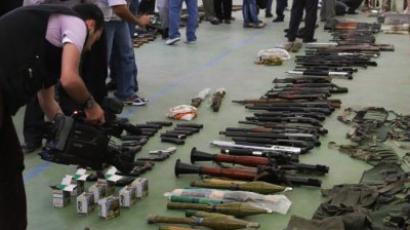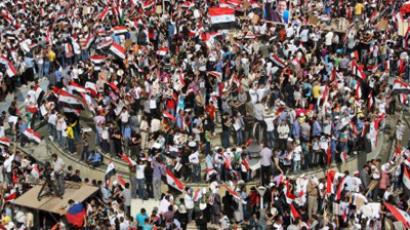Assad: Syria’s fall will set Mideast on fire
Syria’s President Assad has promised “ten Afghan wars” if the West intervenes in his country’s internal affairs.
In his first interview with the Western media since Syria's uprising began, Bashar al-Assad said that actions against his regime could transform Syria into “another Afghanistan.” His comments came after UN Secretary-General Ban Ki-moon once again condemned violence in the country, calling for repression of anti-government protests to end.In an interview given to The Sunday Telegraph, President Assad warned the West that any meddling in his country would carry the risk of setting the whole Middle East on fire. He emphasised that Syria is located at a node of regional strategic interests, and destabilizing the country could lead to an “earthquake”.He warned that a conflict in Syria could be equal to ten wars in Afghanistan, and a split in the country would automatically divide the Middle East and set it ablaze.Bashar al-Assad blamed the Muslim Brotherhood for the escalation of violence in the country, saying Syria had been fighting the organization since the 1950s, and emphasizing that the fight is still on.The violent clashes between the foreign-sponsored and well-armed opposition and Syrian law enforcement are showing no sign of ceasing. The opposition claims Syrian forces have killed over 50 civilians in the last two days. The lives of 30 soldiers were also lost in clashes in the city of Homs and in an ambush in the northern province of Idlib on Saturday.It is seen as significant that most of the Syria’s 20-million-strong population are Sunni Muslims, whereas the country’s leadership – including President Assad – is dominated by the minority Alawite sect – an offshoot of Shi'ite Islam.The Syrian president’s warning came on the eve of Sunday’s talks between his administration and the Arab League, aimed at establishing dialogue between the government and opposition and putting the end to the violence which is raging across Syria.According to UN calculations, over 3,000 people, both opposition and Syrian law enforcement, have died since the violence broke out in March. Damascus says soldiers and police account for 1,100 of the dead. The US and the EU have introduced economic sanctions on Syrian oil exports and state businesses, and are demanding a change of the regime in the country.
Bashar Assad also gave an interview to Russia’s Channel One in which he stated that Russia’s role is decisive in calming the conflict in Syria. He said that the Syrian authorities have been in touch with their Russian colleagues from the very start of the crisis and have kept them informed of every ongoing detail. In the interview he said that he is willing to cooperate with all opposition parties that have emerged during the seven-month uprising against his regime.“We are in contact with all political forces, both old ones and those which formed during the ongoing crisis… We can’t judge whether they have the support of the people or not. A clear answer to this question will be known after the election, which we expect to happen in February next year,” Assad said.But he also raised questions about the true nature of the forces that are fighting against his government.“The information obtained during the latest interrogation of terrorists shows that there was arms smuggling to Syria from neighboring states,” the Syrian leader told Channel One. “The campaign was funded from abroad and we have a list of those who are responsible for this.”Assad expressed gratitude to Russia for using its veto in the UN Security Council at the start of October to block a harsh resolution on Syria and expressed hope that Moscow will continue to support the Syrian leadership.Russia has been supporting Damascus ever since the violence between armed opposition and Syrian law enforcement began in February. At the same time, Russian President Dmitry Medvedev has insisted that if the Syrian leadership fails to sit down with the opposition at the negotiating table, it will have to go.In September, the Syrian opposition labeled Moscow an enemy and conducted a Day of Rage at various Russian embassies around the world. They also demanded Western powers establish a “no-fly zone” over Syria, similar to the one set up in Libya.
However, dissident Syrian writer and democracy campaigner, Michel Kilo, thinks the majority of the population does not want a military solution to the crisis.“We are against military intervention whether today, tomorrow or in ten years’ time,” says Kilo. “We fight for freedom and we do not want to add external slavery to our domestic one. We do not want to become a part of the struggle between international and domestic forces.“Syrians are peaceful. They want to progress under conditions of freedom and development and they do not want to be turned into a concentration camp, a polygon for larger countries,” Michel Kilo concludes.














